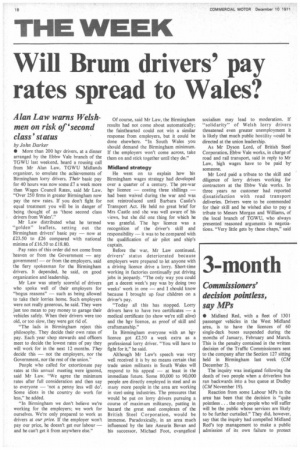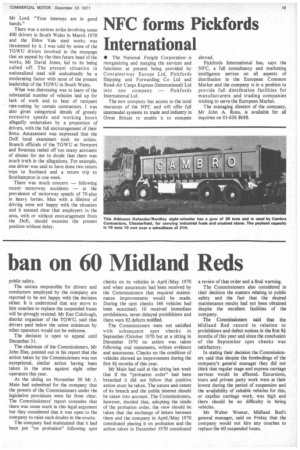3-month ban on 60 Midland Reds
Page 20

Page 21

If you've noticed an error in this article please click here to report it so we can fix it.
Commissioners' decision pointless, say MPs
• Midland Red, with a fleet of 1301 passenger vehicles in the West Midland area, is to have the licences of 60 single-deck buses suspended during the months of January. February and March. This is the penalty contained in the written decision of the Traffic Commissioners sent to the company after the Section 127 sitting held in Birmingham last week (CM December 3).
The inquiry was instigated following the death of two people when a driverless bus ran backwards into a bus queue at Dudley (CM November 19).
Reaction from some Labour MPs in the area has been that the decision is "quite pointless ... the only people who will suffer will be the public whose services are likely to be further curtailed." They did, however, say that the inquiry had compelled Midland Red's top management to make a public admission of its own failure to protect public safety.
The unions responsible for drivers and conductors employed by the company are reported to be not happy with the decision either. It is understood that any move to hire coaches.to replace the suspended buses will be strongly resisted. Mr Ken Colclough, district organizer of the TGWU, said that drivers paid below the union minimum by other operators would not be welcome.
The decision is open to appeal until December 31.
The chairman of the Commissioners, Mr John Else, pointed out in his report that the action taken by the Commissioners was not exceptional, similar action having been taken in the area against eight other operators this year.
At the sitting on November 30 Mr J. Main had submitted for the company that the powers of the Commissioners under the legislative provisions were far from clear. The Commissioners' report concedes that there was some merit in this legal argument but they considered that it was open to the company to raise such doubts in the courts.
The company had maintained that it had been put "on probation" following spot checks on its vehicles in April /May 1970 and when assurances had been received by the Commissioners that required maintenance improvements would be made. During the spot checks 146 vehicles had been examined; 10 received immediate prohibitions, seven delayed prohibitions and there were 82 defects notified.
The Commissioners were not satisfied with subsequent spot checks in September /October 1970 but at a sitting in December 1970 no action was taken following oral statements, written evidence and assurances. Checks on the condition of vehicles showed an improvement during the first 81months of this year.
Mr Main had said at the sitting last week that if the "probation order" had been breached it did not follow that punitive action must be taken. The nature and extent of its breach and the public interest should be taken into account. The Commissioners, however, decided that, adopting the simile of the probation order, the view should he taken that the exchange of letters between them and the company in April/May 1970 constituted placing it on probation and the action taken in December 1970 constituted a review of that order and a final warning.
The Commissioners also considered in their decision the matters relating to public safety and the fact that the desired maintenance results had not been obtained despite the excellent facilities of the cornpany.
The Commissioners said that the Midland Red record in relation to prohibitions and defect notices in the first months of this year and since the conclusion of the September spot checks was satisfactory.
In stating their decision the Commissioners said that despite the forebodings of the company's general manager they did not think that regular stage and express carriage services would be affected. Excursions, tours and private party work were at their lowest during the period of suspension and the availability of suitable vehicles for this, or express carriage work, was high and there should be no difficulty in hiring vehicles.
Mr Walter Womar, Midland Red's general manager, said on Friday that the company would not hire any coaches to replace the 60 suspended buses.




































































































